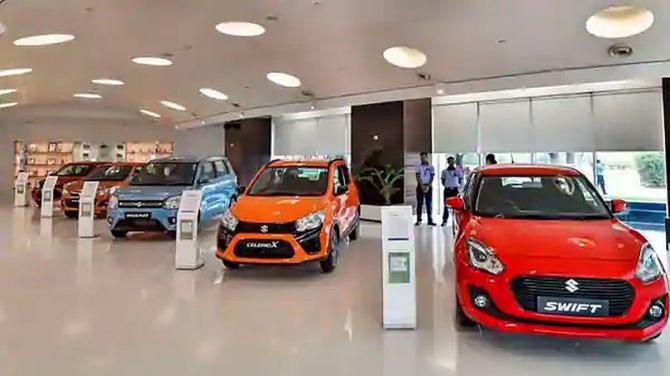The stock of the country’s largest passenger vehicle maker, Maruti Suzuki India (MSIL), has been hitting successive all-time highs over the past three trading sessions.

The rally in the scrip has helped it notch over a 21 per cent gain since the start of February, outperforming the National Stock Exchange Nifty Auto Index.
The gains for the leader of small passenger cars have been more recent, as the company still trails the Nifty Auto over one- and two-year periods.
In fact, the company had a weak model pipeline in 2020–21 and 2021–22 in contrast to its peers, who launched a slew of new vehicles in the utility vehicle (UV) segment.
This led to the Japanese-owned car maker’s market share in the UV segment falling from 28 per cent in 2018–19 to a low of 18 per cent in 2022–23.
However, the company has launched four new models (the Grand Vitara, Jimny, Fronx, and the Invicto) and a Brezza refresh over the past year and a half, helping it to regain most of its share.
In addition to this, Arun Agarwal, vice-president and analyst-fundamental research at Kotak Securities, highlights that MSIL’s wholesale volume growth (year-on-year) in January and February 2024 has been better compared with volume growth witnessed in the nine months of 2023–24 (FY24).
The company’s sales volume for February was up a healthy 14.6 per cent.
While domestic volumes were up 8.7 per cent, exports grew by 68 per cent.
The company achieved its highest-ever monthly exports of 28,927 units, accounting for about 15 per cent of overall volumes.
Sport utility vehicle (SUV) volumes saw a growth of 82.5 per cent, given a strong lineup, aggressive marketing spend, and the relaunch of the Brezza in a hybrid version, says Centrum Research.
Research analyst Shirish Pardeshi of the brokerage, which has a target price of Rs 15,082 a share, expects the company’s performance going ahead to be led by a reshaping of its portfolio and driven by SUVs, visibility on electric vehicle (EV) entry in 2024–25, and consolidation of Suzuki Motor Gujarat.
One area that brokerages are positive about is Maruti’s technology-agnostic approach to the business and decision not to limit its engine technology options.
This has helped the company adapt to customer shifts towards alternatives.
Say research analysts Vivek Kumar and Ronak Mehta of JM Financial Research, “Global automakers (Mercedes-Benz, Ford, General Motors, Volkswagen, among others) are scaling back EV investments and turning towards hybrids due to shifting consumer preferences and challenges like inadequacy and slow pace of charging infrastructure expansion. We believe the situation is no different in India.”
The brokerage believes that MSIL, with its technology-agnostic approach (hybrids, EVs, compressed natural gas or CNG, flexible fuel, etc.), is well-positioned (and hedged) amidst the slowing pace of electrification.
MSIL is developing its own cost-effective ‘series’ hybrid solution for the small car segment and will continue to source Toyota’s hybrid technology for larger SUVs and multi-purpose vehicles.
It has plans to launch five hybrid models over the next two to three years.
The company has also stayed ahead of the curve when it comes to CNG, as it was the first automaker to launch factory-fitted CNG vehicles in 2010.
The company’s CNG sales have grown fivefold in the past five years, and its CNG penetration has increased to 30 per cent.
While the company’s CNG volumes in 2019–20 were 106,000 units, it is expected to end FY24 at 545,000 units.
It had three models offering CNG variants in 2010–11; the list has jumped to over 13 now, with most models offering this option.
CLSA Research recently put out an ‘outperform’ call on the company as it expects it to benefit from an increase in the share of CNG-powered vehicles and hybrid passenger vehicles.
This should help the company offset its weaker positioning in EVs, it adds.
The stock is trading at 23.5 times its calendar year 2025 earnings per share, which is below its 10-year average price-to-earnings multiple.
CLSA has a target price of Rs 12,890.
The other trigger for the company could be a decision by the government to cut duties on hybrids.
Currently, hybrid cars attract a goods and services tax (GST) of 43 per cent.
The government has mooted a proposal to bring the same down to 12 per cent at the next GST Council meeting.
Morgan Stanley Research believes that a potential hybrid duty cut could be a rerating trigger for Maruti.
If the GST on hybrids comes down to 12 per cent, it will mark a sizeable win for the company, says the brokerage, which has an ‘overweight’ rating on the company with a target price of Rs 11,228.












 © 2025
© 2025